
Ghana’s strengthening economic environment, stable political environment and growing social enterprise sector render the country well suited to the development of an impact investment industry.
We have further reason to be optimistic for the future of impact investment in Ghana: it lies in the hands of women and young people. 39% of social enterprises are run by women entrepreneurs, and 43% of the social enterprises are led by people between the ages of 25 and 34. They are also running young enterprises: over half of all social enterprises in Ghana have been set up in the past five years.

Population (2018)
The population in Ghana has steadily been growing from 22.7 million to 29.6 million over the past 10 years.

GDP (PPP, 2017)
Ghana’s GDP is US$ 144.5 Billion. It expanded by 8.5% in 2017 from 3.6% in 2016.

Human Development Index (2017)
Human Development Index in Ghana was 0.592 in 2017, and has been increasing at an average annual rate of 1.06% since 1996, when it was 0.47.

Financial Access (2017)
Driven by digital banking and smartphones, financial inclusion doubled to 58% between 2011 and 2017.

Ease of doing business (2018)
Ghana recorded an improvement in World Bank’s Ease of Doing Business. The country was ranked 114 in 2018 as compared to 120 in 2017.
No Content Set
Exception:
Website.Models.ViewModels.Components.General.Highlight.HighlightComponentVm

Corruption Index (2017)
Ghana is ranked 81st according to the Global Corruption Perception Index (CPI) report.
Ghana has one of Africa’s fastest-growing economies and is one of the only African countries on track to meet the UN’s Sustainable Development Goal (SDG) of 7% gross domestic product growth p.a. by 2030 (SDG report). Ghana’s president, Nana Akufo-Addo committed to delivering ‘Ghana Beyond Aid’ – a package of reforms to free the country from IMF rescue packages (the 16th rescue package ended in April 2019).
The president has also been praised for curbing inflation: it fell to 9% this year from 17% in 2016. Ghana gained ‘lower middle income’ status from the World Bank in 2011 after the country started oil production. Paradoxically, this resulted in a reduction in traditional donor grants, which then increased the need for alternative forms of capital to meet its growing economy. This includes the use of private capital to support public priorities and SDG goals; impact investment is a clear way to make this happen.









